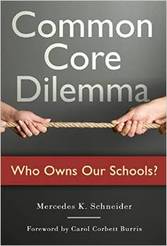On June 6, 2015, Huffington Post education editor Rebecca Klein published a piece titled, "5 of the Most Extreme Claims Made Against Common Core in the Last 5 Years." (Interestingly, Klein chose to publish her post under the category of "politics" rather than "education.")
She apparently offers her post to commemorate the fifth anniversary of Common Core completion.
Sure, Klein notes that not all opponents to Common Core promote extreme stances. However, by emphasizing the extremes and dismissing moderate arguments in a couple of statements, Klein's post promotes the idea that Common Core is really sound, and those advancing the Five Fringe Arguments highlighted in her post constitute the "some criticism" responsible for making Common Core "a polarizing issue."
Here is the heart of her Common Core sell:
The standards, which have been adopted in a majority of states, emphasize critical thinking over rote memorization, and aim to make students more college- and career-ready. A bipartisan group of education experts, governors and state school chiefs developed the standards, and the Obama administration incentivized states to adopt higher standards through its Race to the Top competition.
There are vocal opponents on both ends of the political spectrum. Their reasons vary: Some disagree with content of the standardized tests associated with Common Core, while others say the standards exemplify federal overreach. But some criticism -- which has, over the years, turned Common Core into an acutely polarizing political issue -- is far more extreme.
Let us launch right into exploring the above, shall we?
Klein's first statement, "The standards, which have been adopted in a majority of states," is already a problem. The statement glosses over the highly questionable circumstances associated with Common Core "adoption," not the least of which is the fact that such "adoption" happened for 46 states and three territories a full year before Common Core existed -- by June 2009. Furthermore, those doing the "adopting" -- governors and state education superintendents -- were the only two required to sign the Common Core Memorandum of Understanding (CCSS MOU), thereby committing their state education systems to that which had yet to be created, and which was created in a matter of months and published in a rush.
There's a lot of room for concern and distrust right there, and not just by Klein's five featured extremists.
Next comes the Common Core as "emphasiz[ing] critical thinking over rote memorization." As a critical thinker, I would like to read the empirical studies produced prior to Common Core adoption and that support exactly what the Common Core yields, not what those advertising it have told me it "emphasizes."
No such empirical evidence exists. What does exist is the immediately-published, July 2010 Fordham Institute declaration of Common Core as The Answer despite the fact that even Fordham Institute did not grade Common Core as superior to all existing state standards. That did not stop Fordham Institute current president Michael Petrilli from trying to sell Common Core to states with standards that his organization rated as better than Common Core -- another cause for public mistrust of Common Core and its promoters.
Back to Klein and her Common Core fifth anniversary post:
Klein continues with, "[the standards] emphasize critical thinking over rote memorization, and aim to make students more college- and career-ready," a statement that is also problematic. According to the official Common Core website, Common Core doesn't "aim to." No, no. Common Core is much better than that: Common Core "ensures":
To ensure all students are ready for success after high school, the Common Core State Standards establish clear, consistent guidelines for what every student should know and be able to do in math and English language arts from kindergarten through 12th grade. The standards... are designed to ensure students are prepared for today's entry-level careers, freshman-level college courses, and workforce training programs. [Emphasis added.]
That's right, America, Common Core is guaranteed, according to its website. However, the Common Core license holders -- the National Governors Association (NGA) (a lobbying organization that has its own 501(c)3 nonprofit) and the Council of Chief State School Officers (CCSSO) (also a lobbying organization with its own 501(c)3 nonprofit) -- are not to be held in any way responsible for the outcome of Common Core. So saith their license:
NGA Center/CCSSO shall be acknowledged as the sole owners and developers of the Common Core State Standards, and no claims to the contrary shall be made. ...
THE COMMON CORE STATE STANDARDS ARE PROVIDED AS-IS AND WITH ALL FAULTS, AND NGA CENTER/CCSSO MAKE NO REPRESENTATIONS OR WARRANTIES OF ANY KIND, EXPRESS, IMPLIED, STATUTORY OR OTHERWISE, INCLUDING, WITHOUT LIMITATION, WARRANTIES OF TITLE, MERCHANTIBILITY, FITNESS FOR A PARTICULAR PURPOSE, NONINFRINGEMENT, ACCURACY, OR THE PRESENCE OR ABSENCE OF ERRORS, WHETHER OR NOT DISCOVERABLE. [Emphasis added.]
Klein surely could have brought up this information as part of the public distrust of Common Core, but she chose not to. Instead, she continues her gloss with, "A bipartisan group of education experts, governors and state school chiefs developed the standards."
Governors and state school chiefs did not develop Common Core. However, via the CCSS MOU, NGA and CCSSO set the terms for such development, which according to their MOU, centered upon three organizations: Achieve, ACT and College Board.
Note that Common Core development does not center on classroom teachers. Also note that the term Klein uses, "education experts," is a loose construction that allows for Common Core development to be led by the likes of David Coleman, Jason Zimba, and Susan Pimentel -- all at the center of the center of Common Core construction -- and none of whom have K-12 classroom careers.
The truth is that NGA and CCSSO had two work groups with the NGA- and CCSSO-bestowed authority to write the Common Core "anchor" standards and then the standards themselves, respectively. The first group comprised 24 individuals. None was currently in the classroom, which meant that none would have to reckon with the Common Core product in real time.
The second Common Core work group comprised 101 individuals total, some retained from the first group. Of this 101, only five were current classroom teachers.
It is important to note that, initially, NGA and CCSSO did not intend to publicize the names of work group members. However, they yielded to public pressure to release the names of Common Core developers and reviewers to the public. Still, these members signed confidentiality agreements regarding their involvement.
In their CCSS MOU, NGA and CCSSO advertised Common Core development as "an open, inclusive, and efficient process." They chose to focus on the "efficient" second work group (which those with sense call "thrown together"), the one for CCSS development, which was announced on November 10, 2009.
Completed Common Core -- standards for grades K-12 in two subjects -- was officially released only seven months later, and with the math "anchor" standards that the 24-member group was supposed to develop mysteriously missing.
No matter, Common Core was finished. And it was a good thing for the Gates Foundation, which prematurely published an article in the February 2010 Phi Delta Kappan in which Common Core was discussed as though it were already completed.
And therein is yet another cause for public mistrust of Common Core:
Gates bankrolled it, and with his plentiful money, he continues to push for Common Core implementation. In August 2013, I began a series on the number of organizations receiving Gates money to promote Common Core. The first post in that series is one of my most popular posts of all time. Why? People want to know about a billionaire's influence over America's public schools.
And many people do not trust such influence; they view it as the purchasing of a democratic institution. So imagine the public's surprise when in March 2014, former CCSSO CEO Gene Wilhoit admitted to Washington Post reporter Lyndsey Layton that he and education businessman/Common Core "architect" David Coleman actually asked Gates to pay for Common Core in the summer of 2008.
This, my friends, is yet another seed of mistrust sown in the public conscience over Common Core: a Common Core that, as late as September 2014, only 24 percent of public school parents knew "a great deal about," according to Gallup.
In summer 2008, Gates agreed to fund a Common Core that, more than six years later, most public school parents did not know "a great deal about." Now there's a post worthy to be categorized as the "politics" of Common Core.
Continuing with Klein:
She next states that "the Obama administration incentivized states to adopt higher standards through its Race to the Top competition."
The federal role.
Sure, Duncan "incentivized" Common Core. As part of Race to the Top, states were, uh, encouraged to adopt "common" standards and assessments. Indeed, US secretary of education Arne Duncan had already announced in June 2009 that the federal government would have another contest to fund the consortium-developed assessments for Common Core, even before there was a Common Core.
Before there was a Common Core, Duncan was on board, dangling more federal funds for what would be Common Core tests. And he was very protective of that Common Core, with his June 2013 instructions to the press on how to report on Common Core and his now-infamous, November 2013 "white moms" insult in defense of Common Core.
Duncan's public promotion of Common Core and its federally-funded, consortium assessments certainly leave room for the public to have Common Core misgivings.
And yet, here we have Rebecca Klein writing about none of this and instead attempting to turn public attention to a post that reads like it should bear the title, "Common Core Concerns Under the Big Top."
An editorial disappointment.
Well, American public, I am happy to note that I have written a book on the "acutely polarizing issue" of Common Core -- Common Core Dilemma: Who Owns Our Schools? (TC Press).
In it, not once do I postulate that Common Core will "turn kids gay," or "indoctrinate kids under a Nazi society," or "turn kids into green global serfs," or "turn kids into Communists and/or Socialists," or "turn kids against Christianity." Just think of my book as an exploration of the numerous fissures noted in this post -- a 245-page exploration that does the Common Core Product no favors.
My book will be available on June 12, 2015...
Just in time for that less-than-remarkable Common Core fifth anniversary.
A slightly different version originally posted 06-07-15 at deutsch29.wordpress.com
Schneider is a southern Louisiana native, career teacher, trained researcher, and author. Her first book is the ed reform whistle blower, A Chronicle of Echoes: Who's Who In the Implosion of American Public Education (Information Age Press, 2014).



